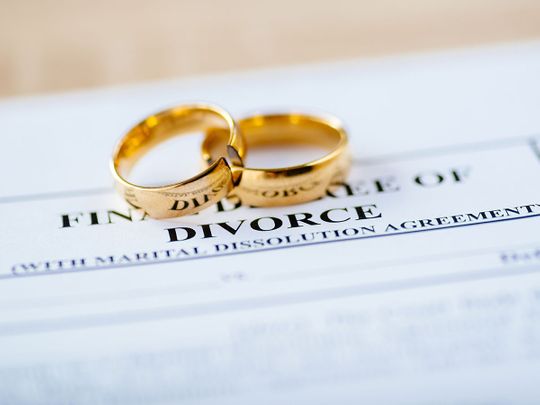
Dubai: Navigating a divorce can be challenging but if you are aware of the legal framework and procedures that you need to follow, it can go a long way in making the process smoother.
Gulf News spoke with legal experts to find out about the laws that are applicable when it comes to divorce proceedings for Muslim couples and the process that they need to follow.
Here’s what you need to know.
Applicable laws and jurisdiction
According to the website of the UAE government, u.ae, Islamic marriages are governed by the Sharia law.
“If both husband and wife are Muslims and residents in the UAE, Sharia or UAE law will most likely be applied to their divorce. The same is likely if the husband is a Muslim and the woman a non-Muslim,” the website states.
Navandeep Matta, Senior Associate- Kochhar and Co. Inc Legal Consultants Dubai Branch, further commented on the federal and emirate laws that regulate divorce proceedings in the UAE.
• Federal Law No. 28 of 2005 amended by virtue of Federal Decree-Law No. 8 of 2019
• Federal Decree-Law No. 5 of 2020
• Federal Decree-Law No. 29 of 2020
“It is a comprehensive piece of legislation based on Sharia law, a religious law forming part of the Islamic tradition. It is derived from the religious precepts of Islam, particularly the Quran and the hadith (the sayings of Prophet Mohammad [PBUH]), which govern various aspects of personal status matters for Muslim residents and nationals of the UAE. Federal Law No. 28 of 2005 covers essential areas such as marriage, divorce, child custody, and inheritance,” he said.
He added that in Abu Dhabi, specifically, Abu Dhabi Law No. 14 of 2021 as amended by Abu Dhabi Law No. 15 of 2021 addresses family matters, including those concerning expatriates residing in Abu Dhabi as well as Muslims with foreign passports from non-religious law countries.
Divorce options for Muslim couples
Madeleine A. Mendy, partner and head of family law at Bin Sevan Advocates and Legal Consultants, further clarified how expatriates can proceed with filing a divorce case.
“In the Abu Dhabi Civil Family Court, based on a recent judgement, the court does not differentiate on the grounds of religion. Thus expatriates filing for divorce in the Abu Dhabi Court, will have the same laws applied to them, regardless of their religion. All expatriates, whether resident or not, can get a divorce in the Abu Dhabi Civil Family Court, as long as they work there or got married there,” she said.
“In Dubai, although the initial file opening and conciliation or mediation procedures are generally the same in the Personal Status Court for Muslim and non-Muslim expatriates, the main difference is when proceedings are litigated, i.e. the parties do not agree to the terms of the divorce and the judge needs to decide,” she added.
According to the experts, there are two possibilities when it comes to a Muslim couple’s divorce:
1. Talaq
Article 100 of the Federal Decree Law 28 of 2005 provides the regulations for the divorce, which can be filed by the husband or his legal representative holding a special Power of Attorney, or from the wife or her legal representative holding a special Power of Attorney, in accordance to what was agreed in the marriage contract. The Article also states: “Divorce is confirmed before the judge by a testimony of two witnesses, or by acknowledgment, and the judge shall issue his decision after verifying the availability of either of the two conditions.”
2. Khula (Divorce filed by wife)
Article 110 of the same law provides regulations that govern the filing of divorce by the wife.
According to Mendy, when a Muslim couple files for divorce, the applicants, whether man or woman, will be required to provide a justification for the divorce.
“This is known as ‘divorce by fault’, if he or she wishes to retain his or her rights. In certain circumstances, a woman can apply for a khula; this will however mean that she will forfeit her rights, like the right to her dowry and maintenance,” she said.
Divorce filing process
Before you begin your divorce process, it is important to get the right legal representative. If you don’t know how to begin your search for a lawyer who is suitable for you, you can find lawyers who are registered at the Dubai Legal Affairs Department here - https://legal.dubai.gov.ae/en/Services/Pages/Legal-Directory.aspx?ServiceID=19. If you are in Abu Dhabi, you can use the online service provided by the Abu Dhabi Judicial Department here: https://www.adjd.gov.ae/sites/eServices/EN/Pages/SearchForLawyer.aspx
You would then need to follow these steps:
1. The first step is to register the case by either party at the Family Guidance Section at the respective judicial department, in one of the emirates, or the family court centres, like Al Adheed in Dubai. A court appointed conciliator will try to reconcile the divorcing parties.
2. The conciliatory procedure is a mandatory process of the divorce proceedings in the UAE. Parties are allowed to raise their concerns pertaining to the marriage in the absence of their respective legal representatives.
3. Amicable divorces can be concluded at this stage. Parties will need to draft a settlement based on the parties’ mutual understanding and sign it before the conciliator.
4. If one of the parties or both of them are determined about the divorce, then the conciliator will provide the claimant with a referral letter, permitting them to proceed before the court to conclude their divorce case.
5. The letter can be submitted to court at any time within three months from the date of issue. Once in court, the particulars of the divorce case fall at the court's discretion and each party has to provide evidence to support own claims against one another as well as in their own defence.










